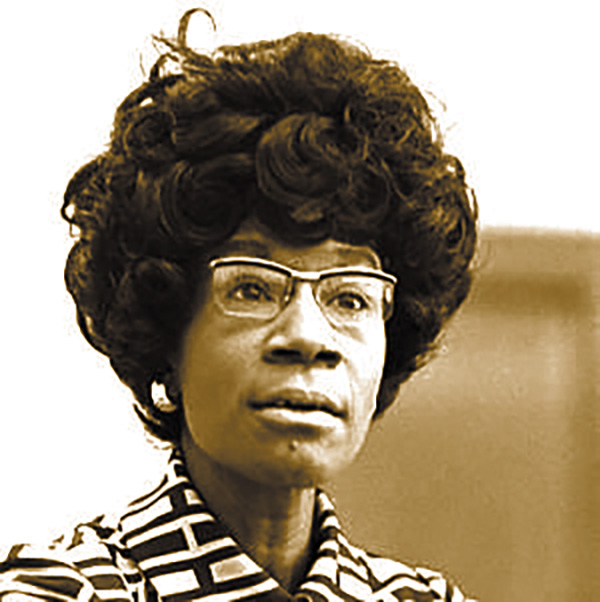Black History
Women’s History Month: NJG Remembers Shirley Chisholm: A Catalyst for Change
Remembering Shirley Chisholm: A Trailblazer in Politics
Celebrating the legacy of Shirley Chisholm, a fearless advocate for equality and change.
#WomenLeaders #PoliticalPioneer #EqualityNow #ShirleyChisholm #WomensHistoryMonth

By Melissa Spellman
Staff Reporter
New Journal and Guide
March celebrates Women’s History month and the legacy of women who paved the way for future generations to thrive in various lanes of industry and politics. A major influence and pioneer for women is Shirley Chisholm.
In 1968 Shirley Chisholm became the first Black woman to serve in Congress. She would remain in the House of Representatives until 1982. In Chisholm’s autobiography “Unbought and Unbossed” she said that one of her handicaps being female put many more obstacles in her way than her being Black. “Tremendous amounts of talent are lost to our society just because that talent wears a skirt,” said Chisholm.
She was born Shirley Saint Hill in November of 1924 in New York City to parents Charles Saint Hill and Ruby Seal. Her father was a native of British Guyana and her mother a native of Barbados. A young Shirley was educated in the British Schools of Barbados where she spent much of her childhood with her grandmother.
In March 1934 she and her siblings returned to Brooklyn. She would go on to graduate from Brooklyn College in 1946. In 1949 she married Conrad Chisholm and they would later divorce in 1977.
Chisholm earned a master’s degree in elementary education from Columbia University and started off her career as a teacher. From 1953 to 1959 she would serve as director of the Hamilton-Madison Childcare Center and an educational consultant to New York City’s Bureau of Child Welfare from 1959 to 1964.
It would be in 1968 when Chisholm became the first Black congresswoman. She would go on to serve seven terms. Other accomplishments include becoming one of the founding members of the Congressional Black Caucus in 1969. Chisholm was also one of the founders of the National Women’s Political Caucus. She was an avid supporter of the Equal Rights Amendment and legalized abortions during the course of her congressional career.
She shared her thoughts on racism: “Racism is so universal in this country, so widespread and deep-seated, that it is invisible because it is so normal.”
Chisholm published two books, one in 1970 entitled “Unbought and Unbossed,” and another in 1973 called “The Good Fight.” A major pursuit Chisholm is known for is being the first African-American woman to make a bid to serve as the president of the United States. In 1972 she ran for the Democratic nomination. In her book The Good Fight she says, “I ran for the presidency, despite hopeless odds, to demonstrate the sheer will and refusal to accept the status quo.”
She championed many causes such as minority education and employment opportunities. When she left Congress in 1983, she taught at Mount Holyoke College. Chisholm is a shining example and inspiration for all women to not let a male dominated field stop you from playing the game, pursuing your goals, and creating change.
In her autobiography she wrote, “When I die, I want to be remembered as a woman who lived in the twentieth century and who dared to be a catalyst of change. I don’t want to be remembered as the first Black woman who went to Congress. And I don’t even want to be remembered as the first woman who happened to be Black to make a bid for the Presidency. I want to be remembered as a woman who fought for change in the twentieth century. That’s what I want.”
Chisholm died January 1, 2005.